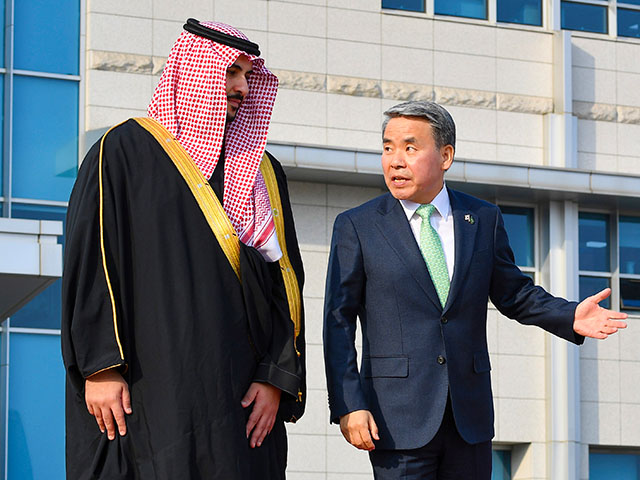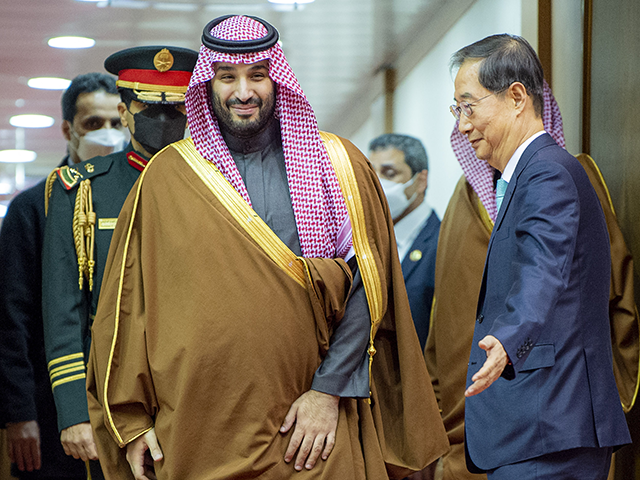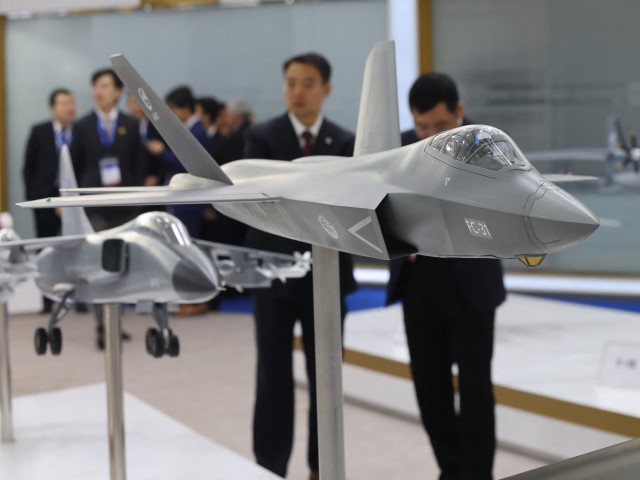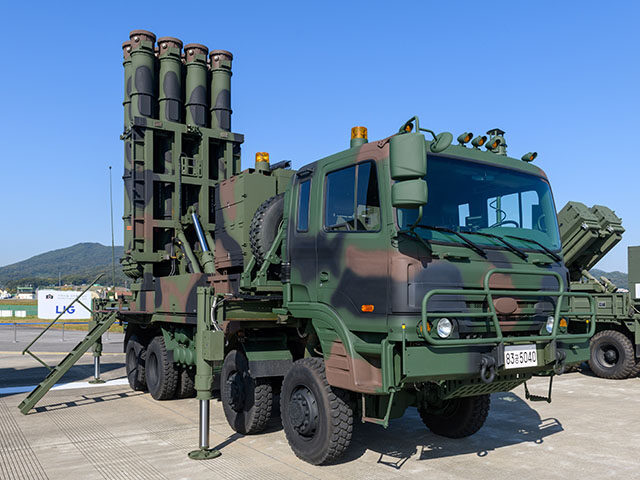The South Korean Ministry of National Defense on Tuesday announced Saudi Arabia has agreed to purchase a $3.2 billion surface-to-air missile defense system, while China gushed that its weapons “attracted great interest” from the Saudis at a defense show in Riyadh over the weekend.
The Saudis are also making strides with indigenously produced military systems, potentially marking the definitive end of the Kingdom’s dependence upon the United States for defense products.
RELATED VIDEO — Maher: We Now Have an Iran, China, Russia Axis of Evil and Biden Pushed Saudis Towards China:
Saudi arms purchases from the U.S. became politically problematic for two main reasons: criticism of heavy civilian casualties from the Saudi intervention in Yemen’s civil war, and the growing schism between Riyadh and Washington following the election of President Joe Biden. Human rights activists have pressured the U.S. to halt arms sales to protest the Saudi’s human rights record and their conduct in the war in Yemen.
Saudi Arabia remained the largest customer for American military hardware at the close of 2023, ringing up $84.3 billion in purchases. The Saudis have one of the largest defense budgets in the world, ranking behind only the U.S., China, Russia, and India.
The trend away from complete reliance on the U.S. for arms began with Saudi Vision 2030, the roadmap for a post-oil economy devised nearly a decade ago by Crown Prince Mohammed bin Salman (MBS), who is now the de facto chief executive of the country.

Then-South Korean Defense Minister Lee Jong-sup, right, and Saudi Arabian Minister of Defense Khalid bin Salman Al Saud attend the welcoming honor guard ceremony at the defense ministry on March 7, 2023, in Seoul, South Korea. (Song Kyung-Seok/Pool Photo via AP)
Among other initiatives, the plan called for about half of Saudi Arabia’s arms to be produced locally by 2030. The General Authority for Military Industries (GAMI) took another step in that direction on Tuesday by inaugurating a drone factory in Riyadh, under the management of a Saudi firm called INTRA Defense Technologies.
GAMI described the factory, which is scheduled to produce up to 120 unmanned aerial vehicles (UAVs) per year, as a “significant achievement” that would greatly enhance both the Kingdom’s drone capabilities and its high-tech export market.
On Tuesday, the Saudi Defense Ministry reportedly agreed to buy South Korea’s Cheongung M-SAM II surface-to-air missiles, which can intercept both other missiles and aircraft. The deal was hammered out by the defense ministers of both countries during talks in Riyadh over the weekend.
Produced by South Korean firm LIG Nex1, the Cheongung (“Iron Hawk”) is capable of intercepting hostile missiles at relatively low altitudes. It has an advanced radar system that can guide its missiles toward their targets, but the missiles can also navigate on their own if the enemy disrupts communications with the launcher.

Crown Prince Mohammed bin Salman of Saudi Arabia (L) is welcomed by Prime Minister of South Korea Han Duck-soo (R) with an official ceremony in Seoul, South Korea, on November 16, 2022. (Royal Court of Saudi Arabia / Handout/Anadolu Agency via Getty Images)
The Cheongung is a “hit-to-kill” interceptor, meaning it was designed to intercept enemy weapons by scoring direct hits on them, rather than detonating near them in midair. The system was developed after South Korea began to worry that its older surface-to-air missiles could not keep up with the latest North Korean ballistic missile designs.
Saudi Arabia’s fellow Gulf oil state, the United Arab Emirates (UAE), purchased the Cheongung II system from South Korea in January 2022. The $3.5 billion sale was pushed by then-South Korean President Moon Jae-in during a visit to the Emirates.
China’s state-run Global Times reported that China’s exhibits at the World Defense Show 2024 in Riyadh over the weekend “attracted great interest” from the Saudis and other shoppers. The Global Times boasted that China’s exhibit was second only to host Saudi Arabia’s in size:
The Chinese arms firms put a complete spectrum of their top products on display, ranging from land, sea, and air, including warplanes like the FC-31 stealth fighter jet, the JH-7 fighter bomber, the Y-20 strategic transport aircraft, the Y-9 tactical transport aircraft, and the AG600 amphibious, drones like the Wing Loong series, the CH series, and the FH series, plus vessels, tanks and armored vehicles, howitzers, and multiple launch rocket systems, radars, as well as air defense guns and missiles, according to media reports.

Visitors attend the ‘World Defense Show 2024’, north of the Saudi capital Riyadh on February 4, 2024. (Fayez Nureldine / AFP via Getty Images)
The Global Times and other Chinese state media advised the Saudis that Chinese firms would be “good partners” for the “challenging task” of reaching 50 percent localized military procurement by 2030. China’s “complete industrial chain” would ostensibly help the Saudis develop their own defense infrastructure much faster, and Chinese firms would be happy to ship components overseas so the Saudis could assemble the weapons and vehicles themselves.
“Chinese defense products are not only affordable, but also feature advanced technologies and are of top quality,” the Global Times touted. “They also provide complete after-sales services and do not attach unreasonable political strings.”
That last comment was clearly a jab at the United States and a restatement of China’s sales pitch to the developing world that it cares nothing about human rights or democracy, so it will not render the kind of moral judgments the Western world does. There is every reason to believe the Saudis and other Middle Eastern powers are receptive to that pitch after years of hearing activists insist their supply of arms should be cut off to punish them for making war against the Iran-backed Houthi insurgents of Yemen.

COMMENTS
Please let us know if you're having issues with commenting.